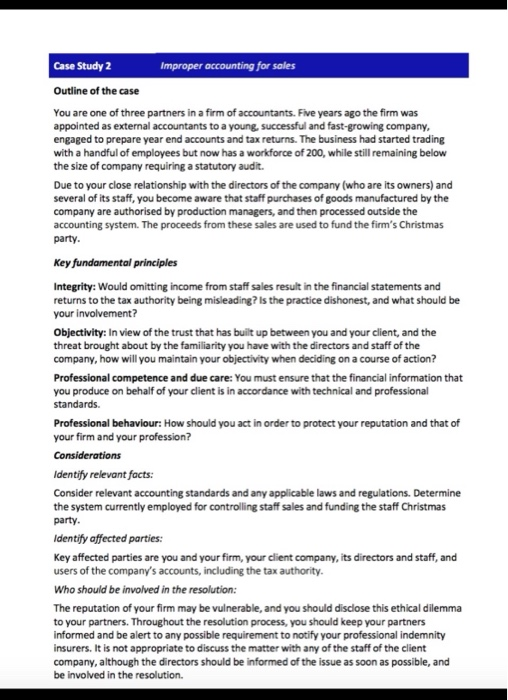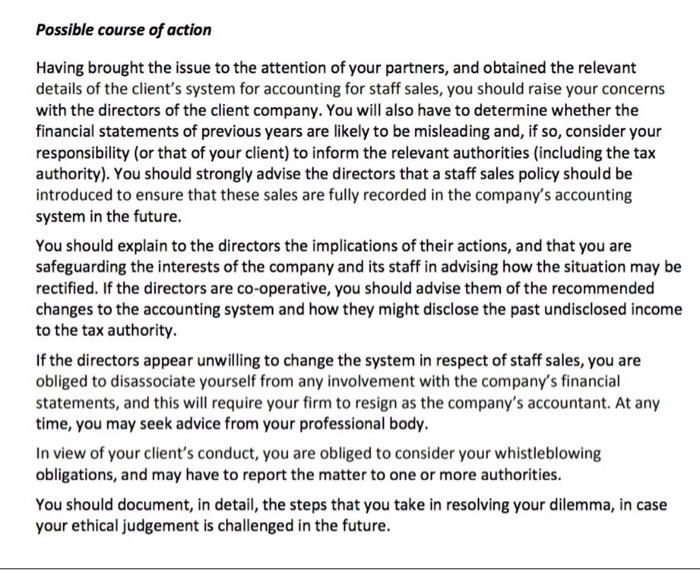A- What is the problem?
B- What are the posable actions?
C- what are the constraints related to the problem?
D- what are the likely effects of the possible courses of action on stakeholder?
E- The best course of action?
Case Study 2 Improper accounting for sales Outline of the case You are one of three partners in a form of accountants. Five years ago the firm was appointed as external accountants to a young successful and fast-growing company, engaged to prepare year end accounts and tax returns. The business had started trading with a handful of employees but now has a workforce of 200, while still remaining below the size of company requiring a statutory audit. Due to your close relationship with the directors of the company (who are its owners) and several of its staff, you become aware that staff purchases of goods manufactured by the company are authorised by production managers, and then processed outside the accounting system. The proceeds from these sales are used to fund the firm's Christmas party. Key fundamental principles Integrity: Would omitting income from staff sales result in the financial statements and returns to the tax authority being misleading? Is the practice dishonest, and what should be your involvement? Objectivity: In view of the trust that has built up between you and your client, and the threat brought about by the familiarity you have with the directors and staff of the company, how will you maintain your objectivity when deciding on a course of action? Professional competence and due care: You must ensure that the financial information that you produce on behalf of your client is in accordance with technical and professional standards. Professional behaviour: How should you act in order to protect your reputation and that of your firm and your profession? Considerations Identify relevant facts: Consider relevant accounting standards and any applicable laws and regulations. Determine the system currently employed for controlling staff sales and funding the staff Christmas party. Identify affected parties: Key affected parties are you and your firm, your client company, its directors and staff, and users of the company's accounts, including the tax authority. Who should be involved in the resolution: The reputation of your firm may be vulnerable, and you should disclose this ethical dilemma to your partners. Throughout the resolution process, you should keep your partners informed and be alert to any possible requirement to notify your professional indemnity Insurers. It is not appropriate to discuss the matter with any of the staff of the client company, although the directors should be informed of the issue as soon as possible, and be involved in the resolution. Possible course of action Having brought the issue to the attention of your partners, and obtained the relevant details of the client's system for accounting for staff sales, you should raise your concerns with the directors of the client company. You will also have to determine whether the financial statements of previous years are likely to be misleading and, if so, consider your responsibility (or that of your client) to inform the relevant authorities (including the tax authority). You should strongly advise the directors that a staff sales policy should be introduced to ensure that these sales are fully recorded in the company's accounting system in the future. You should explain to the directors the implications of their actions, and that you are safeguarding the interests of the company and its staff in advising how the situation may be rectified. If the directors are co-operative, you should advise them of the recommended changes to the accounting system and how they might disclose the past undisclosed income to the tax authority. If the directors appear unwilling to change the system in respect of staff sales, you are obliged to disassociate yourself from any involvement with the company's financial statements, and this will require your firm to resign as the company's accountant. At any time, you may seek advice from your professional body. In view of your client's conduct, you are obliged to consider your whistleblowing obligations, and may have to report the matter to one or more authorities. You should document, in detail, the steps that you take in resolving your dilemma, in case your ethical judgement is challenged in the future








